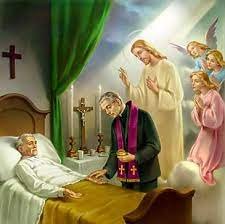The Sacrament of the Sick
The 'Sacrament of the Sick' is only celebrated/administered by a priest. If someone is going into hospital for surgery, or is seriously ill, or is growing weaker and weaker due to age, then they are encouraged to receive the Sacrament to give them strength and hope.
Like all the sacraments, holy anointing was instituted by Jesus Christ during his earthly ministry. The Catechism explains, "This sacred anointing of the sick was instituted by Christ our Lord as a true and proper sacrament of the New Testament. It is alluded to indeed by Mark, but is recommended to the faithful and promulgated by James the apostle and brother of the Lord" (Catechism of the Catholic Church 1511; Mark 6:13; Jas. 5:14-15).
The anointing of the sick conveys several graces and imparts gifts of strengthening in the Holy Spirit against anxiety, discouragement, and temptation, and conveys peace and fortitude (CCC 1520). These graces flow from the atoning death of Jesus Christ, for "this was to fulfil what was spoken by the prophet Isaiah, ‘He took our infirmities and bore our diseases’" (Matt. 8:17).
“Are any among you sick? They should call for the elders of the church and have them pray over them, anointing them with oil in the name of the Lord. The prayer of faith will save the sick, and the Lord will raise them up…”
James 5:14, 15
CCC 1532 The special grace of the sacrament of the Anointing of the Sick has as its effects:
- The uniting of the sick person to the passion of Christ, for his own good and that of the whole Church;
- The strengthening, peace, and courage to endure in a Christian manner the sufferings of illness or old age;
- The forgiveness of sins, if the sick person was not able to obtain it through the sacrament of Penance;
- The restoration of health, if it is conducive to the salvation of his soul;
- The preparation for passing over to eternal life.
This sacrament of holy anointing used to be known as "Extreme Unction" and people thought of it simply as a sacrament for the dying. However, it is first and foremost a sacrament for healing, and can be administered by the priest to anyone who is sick, inviting God's healing Grace to bring them consolation, peace, and restoration to health.
Nonetheless, it is also a sacrament of particular comfort to those who feel their call home to God might be very near, and in such circumstances please do not hesitate to call the priest to visit. Used at times like this, the sacrament is sometimes known as the "Last Rites," and whilst strictly speaking this is not the correct use of the term, we will understand what you mean.
The oil that is used has been blessed by the Bishop on Holy Thursday, before being distributed to all the churches of the diocese.

